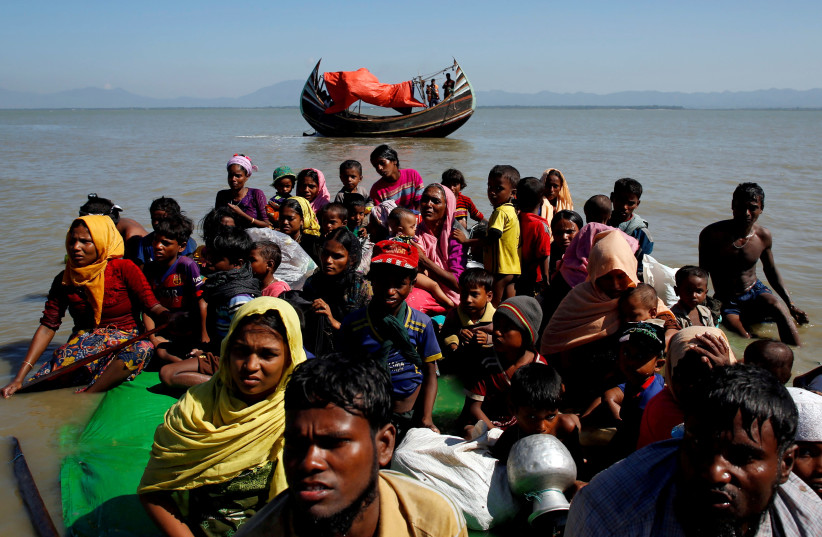Religion, an essential part of national and cultural life in many countries, is being increasingly used as a political tool to wield power and potentially perpetuate violence, in particular against minorities.
This weaponization of religion carries grave implications for societies as the threat of violence, often used in the name of security, is wielded against more vulnerable segments of society, who often have limited agency to resist such practices and find little support from sympathizers.
In recent times, the most commonly noted example of this has come from my own religion, Islam. It has been heart-breaking to observe how a religion that could be such a force for peace was instead distorted to justify heinous crimes – from enslaving whole cities in Syria and Iraq to carrying out terrorist atrocities in Europe – by the likes of the Islamic State group. Also inglorious is the imposition of a dictatorship on a population, as in Iran.
But other examples abound, sadly.
Myanmar’s military regime has used anti-Muslim narratives that perpetuate hate towards the Rohingya minority. From August 2017, communal violence against the Rohingya resulted in 700,000 of their community fleeing and becoming refugees in Bangladesh.

Myanmar’s framing of Muslims as posing a threat to the Buddhist majority nation has its roots in ultranationalist Buddhist sentiment, but it is a bias that resonates societally not only because similar state propaganda in the past has been deployed, but because Myanmar’s state media and some officials’ Facebook accounts have repeated this framing.
Azerbaijan took to intimidating Armenian civilians in Nagorno-Karabakh earlier this year by blasting the azan, the Muslim call to prayer, on loudspeakers towards Armenian communities. Azerbaijan launched an especially aggressive war against Armenians of Nagorno-Karabakh in 2020. While Azerbaijan has been engaged in ongoing attempts to ethnically cleanse the territory of Armenians, this latest act is a weaponization of Islam as a tool for subjugating an entire group of people.
IN TURKEY, cleric Ahmet Unlu condemned supporters of the pro-Kurdish Peoples’ Democratic Party (HDP) and called on the government to strip them of their citizenship. Ünlü called on God to curse the HDP, the third largest opposition party and second largest opposition party in Turkey’s parliament, called for its destruction, and invoked Turkish ultranationalist framing about perceived Kurdish threats to Turkish sovereignty.
This comes amid Turkey’s intensified crackdown on the HDP, with hundreds of HDP politicians already in prison for several years. Playing to antisemitic feeling in Turkey, Ünlü went on to say the HDP “work for Jews.”
In Israel, which is the home of the three monotheistic religions, religious figures often play a role in keeping the Jewish-Palestinian conflict alive. In Gaza we see Friday sermons vilifying Jews and on the other side, extremist rabbis manifest bigotry toward Palestinians.
Even in the United States, the evangelical movement has been stained by links to White Supremacy – a school of thought that is catastrophically corrosive to any hope for progress in a society that is very multiracial.
These phenomena are especially disturbing to those who, like me, have devoted their lives to making religion a force for good. And it can be just that: Religion – in this case the Jewish religion – gave us the Ten Commandments from which much of modern ethics are derived and the same Ten Commandments are also followed by Islam. Religion teaches you there are consequences, but also urges forgiveness. Religion offers a structure and a comfort.
But religion can also be dangerously potent because it involves faith, asking believers to accept certain things that cannot be proven. With that comes profound responsibility. When religious figures abuse their credibility and influence to whip up hatreds and justify evil, it is criminally irresponsible.
Political weaponization of religion constitutes faith-based violence and it poses a threat to security everywhere. The global community should devote immediate attention to stopping such incitement, and to preventing the victimization of weaker groups and continued loss of liberty and life. The global community must support the protection of religious freedom and tackle hate speech.
Political leaders and religious leaders of all faiths have a responsibility to protect and promote diversity of confession, to weed out and punish religious figures who abuse their influence by involving religions into the political domain, and to promote peaceful coexistence among peoples. Anything else would be an abdication of responsibility.
The writer is the founder and executive director of Islamic Theology of Counter Terrorism, a UK-based think tank. He has authored and edited five books, is a CT Expert at ITSS Verona, a patron of UK-based Muslims Against Antisemitism (MASS), and a member of the British Association for Islamic Studies and the Henry Jackson society. Follow him at twitter.com/dahrinoor2.
